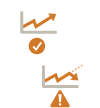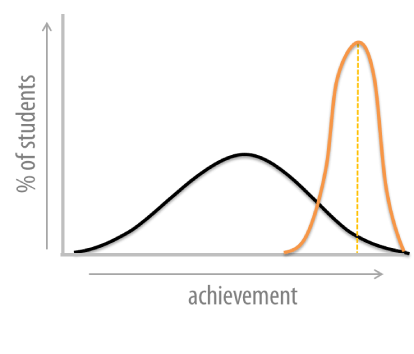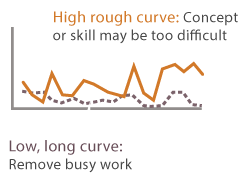Understand how students learn. Predict future behavior. Tailor your instruction to get the best learning outcomes.
Getting Started
Data analysis can open many doors to improving your course, curriculum, and student learning. But if you're new at data analysis, it can all seem confusing and complicated. But it doesn't have to be. By first understanding how data can help and a few basic concepts, you can get started at unlocking the potential in your data.
How can data impact how you teach and how your students learn?
 Predict success & intervene to help those at risk
Predict success & intervene to help those at risk
With data from gradebooks, for example (which typically contain one or more classes' grades for all assignments such as homework, quizzes, exams, finals and participation), you can predict early in the course which students are struggling.
 Track students' learning, skill by skill
Track students' learning, skill by skill
With finer grain data, such as individual answers from a quiz or how students interact with your online course, you can identify which concepts students are comprehending or skills they are acquiring and which require additional practice.
 Test materials' effectiveness
Test materials' effectiveness
Analyze quiz or test questions to find patterns and identify flaws either in their construction or in the effectiveness of the materials they reflect.
 Validating an Approach
Validating an Approach
Test the effectiveness of an activity you've designed or a course you've designed and build evidence to show how it's working.
Assessing the data you have and planning for the data you want
The more extensive your gradebook data and the more robust your course design, the more useful and interesting are the questions that can be explored. But even a minimal set of information -- a gradebook with only midterm and final exam grades -- can provide some guidance on where to focus your attention on future course offerings.
For example, if students are doing well on the midterm, but then have poor performance on the final, then spending some time creating activities that will support students and generate data for the second half of the course is a good first step towards evidence-based improvement. And the kinds of activities that generate useful data also tend to be activites that, purposefully designed, offer good feedback and target common misconceptions.
Beyond considering learning activities, we can also take a closer look at assessment information. While aggregate exam and quiz scores provide a useful touchstone for relating to learning activities, information about individual assessment questions can offer a different type of look into your instruction. Are specific items especially easy or hard? Are certain answers problematic? Are certain learning outcomes being effectively assessed?

Use Data to Test Your Hypothes
One way to get started with data analysis is to think about instructional activities as hypotheses on how students will best learn. DataLab contributor Norman Bier explores this idea.
Some ways to get started with leveraging the data that you do have (and planning for ways to expand the data that you capture):
- Think about what information and data you already have, especially from earlier offerings of a course. Do you have gradebook information? How detailed and in what format are these gradebooks?
- Can you offer consistent categories for the grades that you are capturing?
- Do you have information at a finer-grain size than gradebooks -- quiz or exam questions data? Rubrics from assignments?
- What format is your data in? Can you migrate or transcribe paper-based grades or feedback into a more easy-to-analyze electronic format, such as spreadsheets?
- If you've used an LMS in the past, are there tools for exporting information that was captured from that usage? Most LMS's offer reports and export functionality -- explore it and see what's available.
Ready to get started?
Use DataLab's Gradebook Calculator Tool to see which students are at risk of not passing your course. Or, use our collection of other helpful resources to help you collect more robust data or analyze data you already have.
Key EDM concepts to know
There are many data modeling models and best practices. Here are a few key concepts that can help you decide what data you want to work with and what questions you want to ask. Understanding these will also help as you explore and use DataLab's tools.

